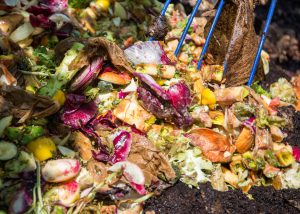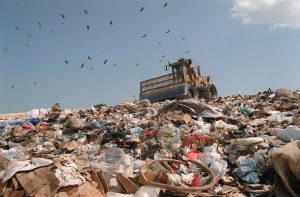
Food waste is one of the main drivers in Florida’s dependence on landfills, which fuel greenhouse emissions and promote climate change.
According to the U.S. Environmental Protection Agency (EPA), landfills contribute annually up to 14 percent of emissions of methane, a greenhouse gas, and are a major contributor to global warming.
The University of Florida Institute of Food and Agricultural Sciences (UF/IFAS) is on a mission to seek alternatives that will encourage Florida residents and business people to steer food waste, grass clippings and more away from landfills by composting these items. That is why UF/IFAS Extension agents, scientists and administrators are leading the charge and joining forces with compost industry professionals and organizations, federal sustainability officers, policymakers and funding organizations to establish the UF/IFAS Compost Consortium.
The goal is to encourage funding organizations, city and county sustainability officers and elected officials to join in developing science-based standards and a Florida compost model to divert the effects of landfills and eliminate the continued dependence on them.
“Compost is a resource that we are throwing into landfills, and we are running out of space,” said Liz Felter, a UF/IFAS regional specialized agent (RSA) and commercial production horticulture agent based in Central Florida at the UF/IFAS Mid-Florida Research and Education Center. “Research working together with industry and municipal partners, can create results that will reduce our environmental impact as well as open the door to economic development with composting businesses throughout the state of Florida.”
On March 27, the UF/IFAS Gulf Coast Research and Education Center will host the initial UF/IFAS Research Compost Consortium Conference from 9:30 a.m. to 3 p.m. This free event is a call to action inviting Florida’s city, county and state decision makers, agriculture and horticulture producers and compost industry services to come together. Lunch is provided and registration is required to this free program.
The goal is to collaborate with the Florida Composting Council to explore economic, policy and environmental research needs for compost. Other efforts to explore include developing incentives to improve capacities for industry partners to guide and assist municipalities in implementing robust environmentally viable, and resourceful compost programs.
“We are calling all federal, state and city agencies interested in helping Florida to establish common ground on to how to use, manufacture and implement policies on composting by making compost commonplace and with sustainable policies that will benefit the environment, communities and our landscape industry,” said Mica McMillan, assistant professor at the UF/IFAS Fort Lauderdale Research and Education Center.
As a locally produced resource, compost can be implemented into production and landscape industry practices. Some examples include use of compost by plant, vegetable and tree growers as well as for landscape design, said McMillan.
“We cannot move forward and make compost commonplace and a resource rather than just another alternative unless we work as one entity,” she said. “By working together, we are stronger, and we can accomplish so much more for Florida, our communities and our environment making us globally competitive.”
McMillan and Felter are bringing these groups together to make composting a universal and established approach in the Sunshine State.

Food is the most common material sent to landfills, comprising 24.1% of municipal solid waste in the United States, according to the EPA. When yard trimmings, wood and paper/paperboard are added to food, these organic materials make up 51.4% of municipal solid waste in landfills.
Despite efforts to keep public recycling programs open, fewer exist. Programs are cutting back on their availability to accept materials or shutting down altogether because they have no more room and cannot continue due to costs, or they are overwhelmed due to the inability to keep up with demands. This creates a situation where recyclable items end up in landfills. For this reason, Florida needs other alternatives for food waste removal.
Composting programs, some with and without curbside pick-up services in San Francisco, Portland, Colorado, Vermont, Virginia and a handful of other municipalities have proven to be successful and an economically viable solution and practice when infrastructure is put in place.
Compost has many uses that go beyond serving as homeowner potting mix and topsoil for gardens. It can be implemented into production and landscape practices, said McMillan.
“After a hurricane, what happens to all the green waste? What about landscape waste? There are companies and municipalities working together, collecting clippings and green waste and bringing material to a compost service, which then transforms it into organic growing media that can potentially be used for landscaping and commercial production for growers,” she said.
On a community scale, this can be accomplished, said McMillan.
“Imagine if most property owners composted their food waste and either used it for their own garden amendment or allowed it to be picked up by a compost service led by a city or county established program for environmental and economic well-being purposes,” she explained. “We can make this the norm rather than the exception in Florida. We’ve been talking about this for decades, let’s now do it.”
###
By Lourdes Mederos, rodriguezl@ufl.edu
ABOUT UF/IFAS
The mission of the University of Florida Institute of Food and Agricultural Sciences (UF/IFAS) is to develop knowledge relevant to agricultural, human and natural resources and to make that knowledge available to sustain and enhance the quality of human life. With more than a dozen research facilities, 67 county Extension offices, and award-winning students and faculty in the UF College of Agricultural and Life Sciences, UF/IFAS brings science-based solutions to the state’s agricultural and natural resources industries, and all Florida residents.
WHY FOOD IS OUR MIDDLE NAME
Feeding a hungry world takes effort. Nearly everything we do comes back to food: from growing it and getting it to consumers, to conserving natural resources and supporting agricultural efforts. Explore all the reasons why at ifas.ufl.edu/food or follow #FoodIsOurMiddleName.
by Lourdes Mederos
Source: UF/IFAS Pest Alert
Note: All images and contents are the property of UF/IFAS.



